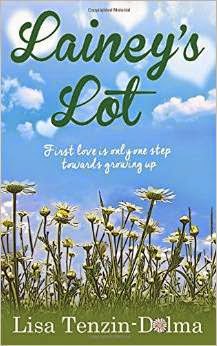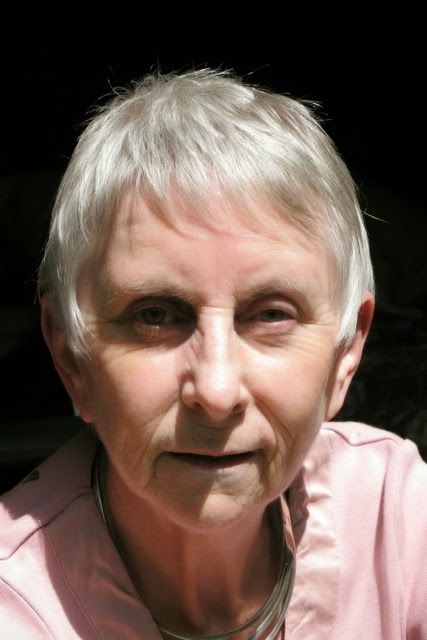At the moment they fall into two genres. The Swan Lake is classed as contemporary fiction, and the Lainey Morgan books, starting with Lainey’s Lot, are Young Adult, though the Lainey books could be considered as crossover books.
What made you choose that genre?
It wasn’t a deliberate choice. The main characters popped
into my head and refused to leave, and they led the storylines. Astarte, from The Swan Lake and Lainey from the YA
books are both quirky, eccentric people and their stories naturally took on a
darkly funny, dramatic tone.
How long does it take
you to write a book?
Usually around three months, but with the Lainey books I
started the first one about 8 years ago, set it aside halfway through to write rather
a lot of commissioned non-fiction books, and only went back to it and finished
it this year.
What is your work
schedule like when you're writing?
I start early, take breaks to walk my dogs (and walking
often clears my mind, too), set some time aside for assessing coursework from
my canine behaviour students in the afternoon, usually finish writing early
evening, and then catch up on mail until about 9pm. While I’m immersed in the
story I tend to lose track of time, though, so often end up writing late into
the night.
Where do you get your
ideas for your books?
With fiction, mostly the ideas come to me out of the blue,
starting with a character and expanding from there, though I have a couple of new
novels on the go that started with a question: What if? This then sparked off a
whole storyline.
The Swan Lake came
about when a friend who was an Intensive Care nurse came to stay. We had a lot more
wine than I’m used to and were laughing about some crazy things that had
happened when I lived in the depths of the country in Ireland, throwing ideas
back and forth about how my friend (a city dweller) would have coped with going
back to nature. That gave me the idea for Astarte’s character, and the next
morning I woke up with the whole story in my mind. It bugged me until I wrote
it down, and the book was written very quickly.
 I started the first Lainey book when my daughter, Amber, was
13 years old, and it was great fun getting into the mind of an adolescent girl
– all those dramas! Amber’s nothing like Lainey, but funnily enough life
imitated art, in a way, because when I was halfway through writing the book
Amber started going out with a boy who was remarkably like Kieran, Lainey’s boyfriend
in the first book – even to his looks and musical talent! They both found that
hilarious.
I started the first Lainey book when my daughter, Amber, was
13 years old, and it was great fun getting into the mind of an adolescent girl
– all those dramas! Amber’s nothing like Lainey, but funnily enough life
imitated art, in a way, because when I was halfway through writing the book
Amber started going out with a boy who was remarkably like Kieran, Lainey’s boyfriend
in the first book – even to his looks and musical talent! They both found that
hilarious.
With non-fiction, the books develop through what I’m
particularly interested in and would like to read books about. I love doing
research and sharing ideas and knowledge!
When did you write
your first book and how old were you?
I wrote my first book when I was 13. We lived in Malaysia at
the time, and my class in school had to do a history project on London in 1665/1666.
It was the time of the Great Plague, so for my project I wrote a novel about a
girl who lived through that. It won me a prize at school but I wouldn’t have
dreamed of sending it to a publisher.
My first published book was a non-fiction book called The Dolphin Experience. That came out in
1992, when I was 38.
What do you like to
do when you're not writing?
I spend as much time as possible with my family, friends and
my two dogs, and I do a lot of teaching work, which I love. I’m principal of
The International School for Canine Practitioners, teaching dog psychology and
behaviour to students all over the world, and I also run the Dog Welfare
Alliance, a non-profit organisation that brings together professionals and the
public and supports rescue centres globally.
I read a lot, in all genres, and there’s always a very varied
pile of books on my coffee table. I play guitar, too, though not as much as I
used to.
What was one of the
most surprising things you learned in creating your books?
How a story can completely take over your mind for the time
it takes to write a book! This week I put a tongue-in-cheek post on Facebook
about how chocolate can help the creative flow for me, and this set off a
discussion with some author and screenwriter friends about how the characters
in a story become very real while we’re writing about them. As one friend so
aptly put it, it’s exhilarating and exhausting, and I agree – to really enter
that world we’re creating, we need to tune in and live inside each character’s
head (the unlikeable ones, as well as the likeable ones). They take on lives of
their own.
How many books have
you written?
I’ve had 22 books published, with another four books coming
out next year: three of those are fiction and one’s non-fiction.
Which is your
favourite and why?
That’s such a tough question to answer – it’s like asking me
which one of my five children is my favourite! I can’t choose. Each book is
different and I’ve thoroughly enjoyed writing all of them. Plus, fiction
writing is totally different to non-fiction. With fiction I’m entering an
imaginary world (that seems very real at the time), whereas while I’m writing
non-fiction I think about what readers need to know about a subject, and how to
make that interesting as well as informative.
The most deeply personal book I’ve written is Charlie: The Dog Who Came in from the Wild, which
will be out through Hubble & Hattie in August 2015. It tells the story of
how I rehabilitated a one-eyed Romanian born-in-the-wild feral dog who had
never mixed with humans or dogs outside his social group before his capture.
The book covers Charlie’s first 18 months with us, and described how I helped
him overcome his many fears and become a fully integrated, much loved member of
our family. It was an intense journey for all of us. I’d kept a journal
throughout, so it was fascinating for me to sift through so many memories and
remind myself of the extraordinary transformation that Charlie’s gone through.
As a child, what did
you want to do when you grew up?
A writer!
What are you working
on now?
I’m working on another Lainey novel, and have several more
books on the back burner.
Bio
Lisa Tenzin-Dolma is the author of over 20 books, principal
of The International School for Canine Practitioners, and founder of the Dog
Welfare Alliance. She has five children and two dogs, and lives in a small
village near Bath, UK.
Websites:
List of titles
- Charlie: The Dog Who Came in from the Wild (Hubble &
Hattie, 2015)
- Lainey’s Lot. Accent Press. (two more Lainey books to come
in 2015)
- The Heartbeat at Your Feet: A Practical, Compassionate New
Way to Train Your Dog. Rowman & Littlefield
- Dog Training: The Essential Guide. Need2Know Books.
- Adopting a Rescue Dog. Phoenix Rising Press
- Mind & Motivation: The Spirit of Success. Phoenix
Rising Press
- The Swan Lake. Phoenix Rising Press (to be republished by
Accent Press 2015)
- Mandala Source Book (with David Fontana). Watkins
Publishing.
- Natural Mandalas. Duncan Baird Publishers.
- Healing Mandalas. Duncan Baird Publishers.
- The Mandala Colouring Kit. Duncan Baird Publishers.
- The Celtic Mandala Colouring Kit. Duncan Baird Publishers.
- Celtic Mandalas Colouring Book. Watkins.
- Buddhist Mandalas Colouring Book. Watkins.
- Healing Mandalas Colouring Book. Watkins.
- 3D Mandalas. Watkins.
- Take Control with Astrology. Hodder Education.
- Teach Yourself Astrology. Hodder Education. McGraw-Hill.
- Understanding the Planetary Myths. Quantum/Foulsham.
- A-Z of Dreaming. Igloo Books.
(Also published by Igloo as Understanding Your Dreams and
Dreams & Dreaming)
- The Glastonbury Tarot. Papaveria Press.
- Swimming with Dolphins. Foulsham.
- The Dolphin Experience. Foulsham.

Critique Service for Writers
Flash 500 Home Page: Flash Fiction, Humour Verse
and Novel Opening Chapter and Synopsis Competitions









